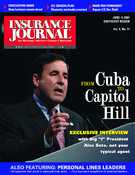Insureds would receive premium discounts for storm mitigation efforts and be able to establish tax-free personal catastrophe savings accounts while insurers would receive tax breaks for writing coastal properties under omnibus coastal insurance legislation taking shape in South Carolina.
The legislation (HB 3820), which has already passed the House and now rests in the Senate, is backed by Insurance Commissioner Scott Richardson and Gov. Mark Sanford.
“The home mitigation part of this bill is huge,” Richardson said. “For every dollar invested in mitigation, the consumer realizes a $10 return.”
According to Richardson, insurers would be required to provide discounts for certain home mitigation practices and disclose the terms of these discounts in plain language.
In addition to obtaining tax credits for retrofitting properties in the mitigation process, consumers will also receive tax credits on the mitigation materials they buy. The bill also allows for tax credits — up to $1,250 — for lower-income property owners who pay more than 5 percent of their incomes towards insurance premiums.
The bill calls for matching grants for homeowners who retrofit their homes with prescribed preventive measures. Eligible properties must have a homestead exemption with an insured value of $300,000 or less. Grants would be limited to $5,000, although low income owners would be eligible for the $5,000 grant without having to meet the matching requirement. Matching fund grants would also be available for local governments to encourage projects that reduce hurricane damage to single-family homes.
In addition, consumers would be allowed to contribute to personal catastrophe savings accounts to cover their deductibles or to self-insure, with the sum in the account being exempt from state income tax. Consumers with deductibles under $1,000 could contribute up to $2,000 to the account. If their deductible is more than $1,000, their contribution limit would be $15,000. For those who self-insure, contributions max-out at $250,000.
“These options give opportunities for each end of the income stream,” Richardson said.
Richardson said he has been working to keep private insurers in the market and create a tax incentive for them to write coastal policies.
“I’ve spent a great deal of time working with insurance companies and I have personally had conversations with many carriers. Insurers will get a 25 percent tax break on all full coverage polices written in coastal areas — it’s enticement for the companies to stay in the market.”
While Allstate has decided not to cancel 2,500 policies, Richardson noted that Companion Property & Casualty Group is increasing its writings and Ironshore is coming in to write condo properties on the coast.
Topics Legislation South Carolina
Was this article valuable?
Here are more articles you may enjoy.


 Former Ole Miss Standout Player Convicted in $194M Medicare, CHAMPVA Fraud
Former Ole Miss Standout Player Convicted in $194M Medicare, CHAMPVA Fraud  Maine Plane Crash Victims Worked for Luxury Travel Startup Led by Texas Lawyer
Maine Plane Crash Victims Worked for Luxury Travel Startup Led by Texas Lawyer  Lawyer for Prominent Texas Law Firm Among Victims ID’d in Maine Plane Crash
Lawyer for Prominent Texas Law Firm Among Victims ID’d in Maine Plane Crash  Zurich Insurance’s Beazley Bid Sets the Stage for More Insurance Deals
Zurich Insurance’s Beazley Bid Sets the Stage for More Insurance Deals 


